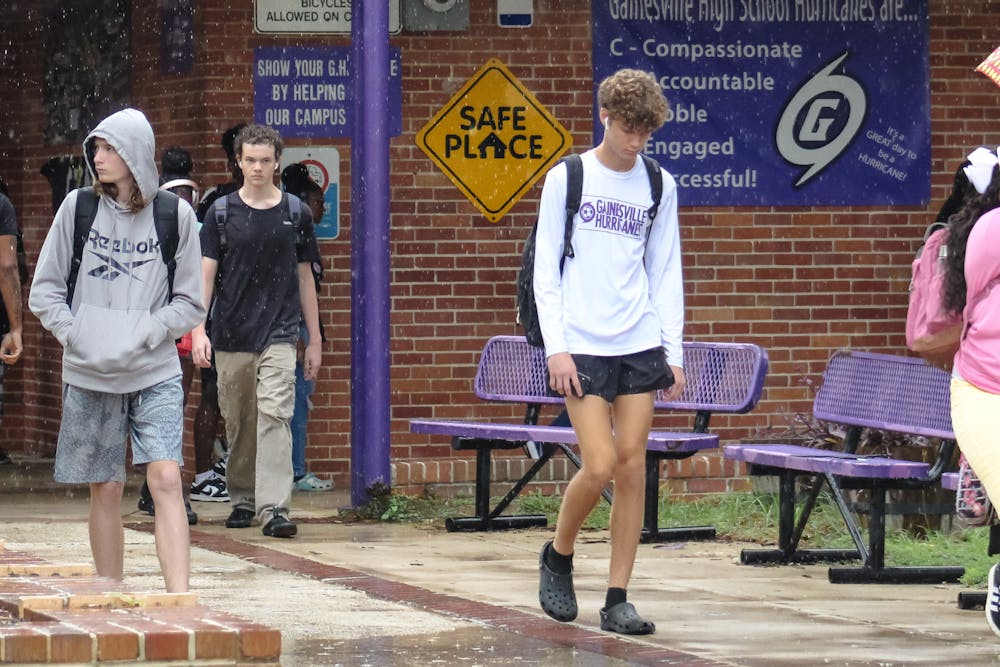Alachua County Public Schools implemented a new safety measure following House Bill 1473, which mandates campus doors across the state remain closed and locked while students are present.
The policy took effect July 1 and aims to enhance school security, but it sparked concern among students and parents about accessibility during emergencies as the school year is in full swing.
The bill is one of many policies passed for school safety after the Marjory Stoneman Douglas High School Public Safety Act in 2018.
Mariamne Puentes, a Gainesville High School junior, said students are required to be seen by a staff member before entering a building, she said.
“When a student is leaving, they have to close the door,” she said. “It locks automatically. They just have to see your face and know it’s you.”
While the locked doors make Mariamne feel safer inside, Fatima Puentes, Mariamne’s sister and GHS freshman, said she worries about the implications during an active shooter lockdown.
“If you’re inside, you’re safe and you’re locked, but if you’re outside, you probably have to go find another place, and most of them won’t open the door for you either,” she said. “They’ll probably think that you could be dangerous.”
Mariamne hopes schools will explore additional safety measures beyond locked doors, she said.
“It’s pretty scary for students, if you’re locked out of your class for something like that,” she said.
Diego Cordova, a GHS freshman, said he has to knock when re-entering buildings after using the restrooms or getting water from the fountains. Someone isn’t always there to open the door each time, he said.
Although he might be missing class time, Cordova said he appreciates the locked doors for preventing unauthorized access.
“People that are not supposed to be there can’t come in without having someone open it,” he said.
To further school safety, Cordova recommends visitors who enter the school be on a student's emergency contact card, he said.
Twila Vante, a 45-year-old nurse and parent of an eighth-grade student at Abraham Lincoln Middle School, first noticed the locked doors when she picked up her son early from school.
Vante feels safer knowing visitors must go through extra measures to enter a school, she said.
“I think it’s needed because right now, it’s not safe,” she said. “There’s a lot of school shootings happening right now, and so that’s big for me and it’s big for my family.”
In addition to locked doors, Vante wants to see more open communication with kids about school safety and school shootings. Their input should hold more weight, she said.
“Kids see that on the news, and they have more questions,” she said. “Kids have a voice. Listen to what they’re saying and ask their opinion. If it’s [about] safety, what do they think about it?”
Dana Ebiasah is a 40-year-old therapist and parent of a sixth-grade student at Abraham Lincoln Middle School. They said although locked doors keep students safe, they worry schools walk a “thin line” by implementing new safety procedures if schools aren’t balancing it with adequate preparedness and practice drills.
Ebiasah said locked doors are also helpful for families battling complex legal situations, such as stay away orders or custody agreements. In these cases, the policy helps ensure that unauthorized individuals, including those legally restricted from contacting or approaching a child, cannot enter the school without authorization.
“Let's try to keep us safe,” Ebiasah said. “I understand the intent, but preparation is everything.”
Doug Pelton, ACPS chief of security and school safety, said ACPS is “ahead of the game” by implementing locked door policies well before it was legislated, he said.
To ensure the locked door policy is consistently enforced throughout all schools, Pelton annually completes an onsite inspection of each school to make sure doors and locks are working properly. The state will also do an inspection of ACPS tri-annually, he said.
“The rules have been communicated out to all principals, all assistant principals, all charter school principals that I communicate with on a daily basis,” he said, “ensuring that all of these practices are implemented and followed throughout the district.”
Pelton said locked doors are just one part of many comprehensive school safety strategies. ACPS schools contain security cameras and video monitoring, resource officers, visitor management softwares and intercoms, he said.
Pelton said he’s heard no concern about accessibility or the risk of students getting locked out. In actuality, it’s “just the opposite,” he said.
“With any legislative change … there’s concerns that it’ll be too difficult,” he said. “It wasn’t that difficult to accomplish. I feel very confident in the ability of our administrators on each of our campuses to make sure that it remains that way.”
Since school administrators are also aware of students who need extra support or extended time to get to class, Pelton said there isn’t any concern the locked door policy will affect students with special needs or physical disabilities, he said.
As ACPS continues to implement future state mandates, Pelton said his next goal is to work to have schools provide a “sally port” style entry, or an entryway that is used to control access into the school. This would help “screen” students and visitors before they enter the actual doors of the school, he said.
“The Marjory Stoneman Douglas Commission has been very helpful,” he said. “It rose out of tragedy, but it is creating legislation that districts across the state are implementing in order to make more secure and safe environments for our children.”
Contact Sara-James Ranta at sranta@alligator.org. Follow her on X @sarajamesranta.
Sara-James Ranta is a third-year journalism major, minoring in sociology of social justice and policy. Previously, she served as a general assignment reporter for The Alligator's university desk.






